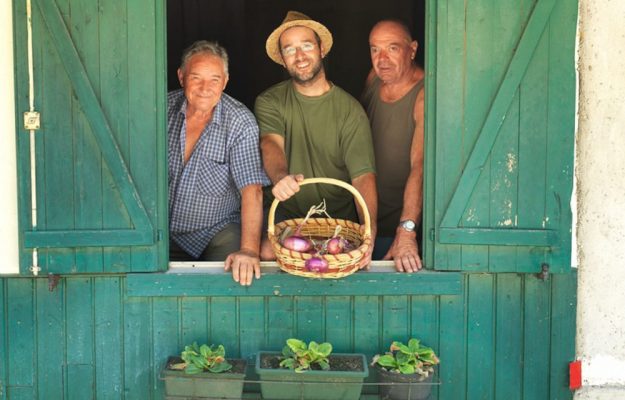Twenty years of commitment, passion and work to eradicate the risk of extinction of native breeds and varieties of vegetables, fruit, breads, cheeses, meats and desserts. Their protection embraces antique crafts, production techniques, the environment, landscapes, territories and cultures. The commitment that today, for the first time, will allow Slow Food Presidia to be able to form Slow Food Communities; in other words, a group of people who work in the area all having a common goal. And they can boast the red snail on the label that tells the singular story of their products. It is an operation of transparency to describe farming, cultivation or processing techniques used by each individual producer. The Slow Food Presidia celebrated their first 20 years of history at “Open Presidia” where over 100 companies, from Piedmont to Sicily, from Emilia Romagna to Lazio participated, and yesterday welcomed fans of “good, clean and fair”.
The Presidia are the projects that Slow Food, through the Foundation for Biodiversity ONLUS (not-for-profit organization) has fully committed to protecting the knowledge and the food, and are “the most effective tool”, emphasized Piero Sardo, president of the Slow Food Foundation for Biodiversity ONLUS, “to defend, support and develop domestic biodiversity; that is, not wild species but those selected from agriculture and livestock”.
Today there are 593 Slow Food Presidia 324 of which are in Italy. There are 5.327products registered in the Ark of Taste, 1.000 of which in Italy, and this goal was achieved in 2020. The numbers of the Presidia have confirmed their growing success: in Italy, in 2000, there were 90 Presidiums while today there are 324. The producers started out with 500 participants and have now reached 2.500. Some of the productions have had a genuine rebirth. This is the case of the Piedmont cattle breed, where the initial 7 breeders have expanded to 62; of the Torre Guaceto “fiaschetto” tomato which increased its production from 250 to 1.500 quintals, or the Ustica lentil whose production over two decades has increased from 2.600 to 9.000 kilos and its price from 3 to 12 euros per kilo.
“The result is extremely positive”, explained Serena Milano, secretary general of the Slow Food Foundation for Biodiversity ONLUS, at the conference “20 years in the name of biodiversity” organized at Nuvola Lavazza in Turin, “it was an original and innovative project that it seemed like a utopia and, instead it worked. There are a lot of data that today demonstrate the positive impact of the Presidia, economic, but also social and environmental. One for all is that the emissions generated by the extensive and small-scale farms of the Presidia are 30% lower than those of similar conventional productions. In many instances there were very few producers when we started and often they were older. Then, new families were added, as well as many young people who decided to work in the countryside, often after attaining a University degree. Producers proud of their work, and who shared production regulations founded associations and consortiums”.
Regarding the production disciplinary regulations, according to Francesco Sottile (Slow Food Italy), “it is the closest point between Slow Food and scientific research, because within that document many elements are the fruit of scientific knowledge, innovation and awareness of the mechanisms that regulate the relationship between production and the environment”. Young producers representing the second generation involved in the Presidiums also attended the conference. They all have the common desire to not abandon the company they inherited, though they are carrying out some personal ideas. Lorenzo Agatiello, 20, producer of the Presidium of the hunchbacked cardoon in Nizza Monferrato, said “I became passionate about agriculture and life in the fields when I was a child, thanks to my paternal grandmother who has cultivated cardoons since the 1960s”, while Lucia and Nicola Ceccarelli from Umbria are holding the flag of smoked holy wine of the Upper Tiber Valley high, “we would like to start producing wine with cutting-edge methods and also build an oil mill”. Manuel Gambon from Friuli, of the Pitina Slow Food Presidium, began producing in 2016, when he opened a meat-processing workshop with his brother. “At home we have always made it following my uncle Danilo’s recipe, who produces it according to his father’s teachings, for self-consumption. What does the Presidium mean to me? It guarantees quality and tradition. I am happy that the production regulations have become even more rigid by inserting the obligation not to use nitrites and nitrates”. These are genuine family stories, because, as the journalist Sveva Sagramola said in her speech, “behind a Presidium there is always the story of a territory, stories of people”.
Copyright © 2000/2026
Contatti: info@winenews.it
Seguici anche su Twitter: @WineNewsIt
Seguici anche su Facebook: @winenewsit
Questo articolo è tratto dall'archivio di WineNews - Tutti i diritti riservati - Copyright © 2000/2026







































































































































































































